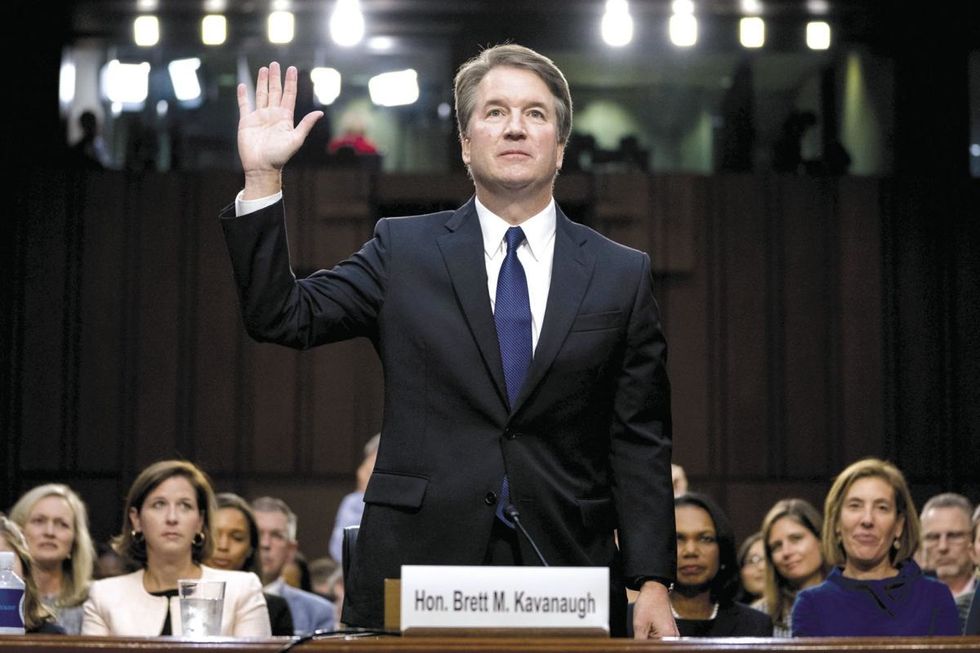A few years ago, two-thirds of Americans couldn't name a single Supreme Court justice. Names like "Ruth Bader Ginsburg" and "John Roberts" were not as immediately identifiable to the public eye as "Hillary Clinton" or "Paul Ryan". This is partially due to the fact that SCOTUS enjoys less media attention than the legislative and executive branches (in order to assure impartiality). And this can also be attributed to the misconception that Supreme Court rulings do not as directly affect Americans as much as legislation pumping through Congress or presidential executive orders. The title of Supreme Court justice does not bring that flair of glamour like the title of "President" or "senator" immediately does. At least, this has been the case for American culture as a whole until recently.
There was an abrupt change in how Americans viewed the prestige of the SCOTUS position. While Gorsuch's hearing went by relatively quietly, Kavanaugh's confirmation hearings became so tumultuous and deeply partisan that they set a dangerous new precedent for the new Supreme Court. And surprisingly, it is not the lurid question of his innocence or guilt that still hangs uncomfortably in the air.
The Supreme Court of the United States was established as a branch intentionally aloof of the other two; where the partisanship divide was no longer relevant. The ultimate purpose of SCOTUS was to determine the constitutionality of government actions, along with further protecting the American citizens from tyranny. The primary issue with Kavanaugh is that blind partisanship drove his hearing. His allegations, his questionable judiciary record, and continuous rejections from both the BAR association and his Alma Mater should have been enough for both parties to block his entrance into the Supreme Court. Surely, both Republicans and Democrats alike want a justice whose integrity and character are not constantly under fire. Therein lies the issue: Kavanaugh's confirmation, despite all of the contrary evidence, set the precedent that it's okay to nominate someone of questionable character so long as they align with your party's values. The nomination for the next justice should not have been so deeply partisan that all 49 Republican senators (with one abstaining) voted to give him a seat on the most prestigious court of the country, regardless of the mounting scandals pressed against him.
Of course, one must take into consideration that the common "innocent until proven guilty" argument was not relevant in these hearings. The misconception that Kavanaugh was on trial further fueled the fervor to allow him to serve. Many howled about the injustice of blocking a man from his rightful spot on the Court because of unproven allegations. Perhaps this would have been a captivating viewpoint if it were not for the fact that it was not necessary to think Kavanaugh a sexual abuser to not want him on SCOTUS. His far-right politics should have sufficed. As it is, the Supreme Court becomes as much a machine of political propaganda if it veers too far into either direction. Sure, you may agree with the beliefs of a far-left or far-right Supreme Court, but this violates its purpose. If that is not cause a for suspicion on its own, what about the White House's collusion with Kavanaugh to hide over 100,000 of his documents? So much for a transparent democracy!
The left, of course, is not innocent in this matter of partisanship either. And for the sake of this article, it is necessary that I mention that as well to avoid misinterpretation of its message. However, by virtue of Kavanaugh's confirmation ultimately being the work of the Republican party, I am naturally going to focus on the erroneous judgment of the right (at least in this case).
Even more dangerously, more and more members of the GOP are beginning to see this as a "win" against Democrats. This idea was especially popularized by Trump's bold statements where he describes his campaign as putting the United States and conservatives on the path to "winning" again. This further affects political discourse by degrading it to essentially a partisan game of football - where each side blindly cheers for their team regardless of the consequences. The difference is that a congressman or woman wholeheartedly supporting, let's say, the Patriots is much less damaging to America's social fabric than to carry the same mentality into politics. The smug attitude from the GOP at pushing Kavanaugh into the Court comes from a primitive desire to just "win the argument", not from genuinely wanting the best person for the job. Otherwise, as put in the aforementioned reasons, not every single Republican would have wanted him as a justice. When one allows the breakdown of one's mentality from the allowance of impartial educated discourse to simply rooting for their team to win, it is easy to overlook all of the glaring flaws of their team, to begin with. Tom Brady may have mediocre sportsmanship and continuous allegations of corruption, but damn can he throw a ball.
Alas, the precedent is clear: Kavanaugh's nomination was a blatant acceptance of the US government infecting the Supreme Court with pure partisanship - defiling the inherent justification of the Court. This begs the questions to all Republicans who staunchly defended Kavanaugh in the proceedings: wanting a conservative justice is understandable, but did it have to be Kavanaugh?



 StableDiffusion
StableDiffusion StableDiffusion
StableDiffusion StableDiffusion
StableDiffusion Photo by
Photo by  Photo by
Photo by  Photo by
Photo by 
 Photo by
Photo by  Photo by
Photo by  Photo by
Photo by  Photo by
Photo by  Photo by
Photo by 












